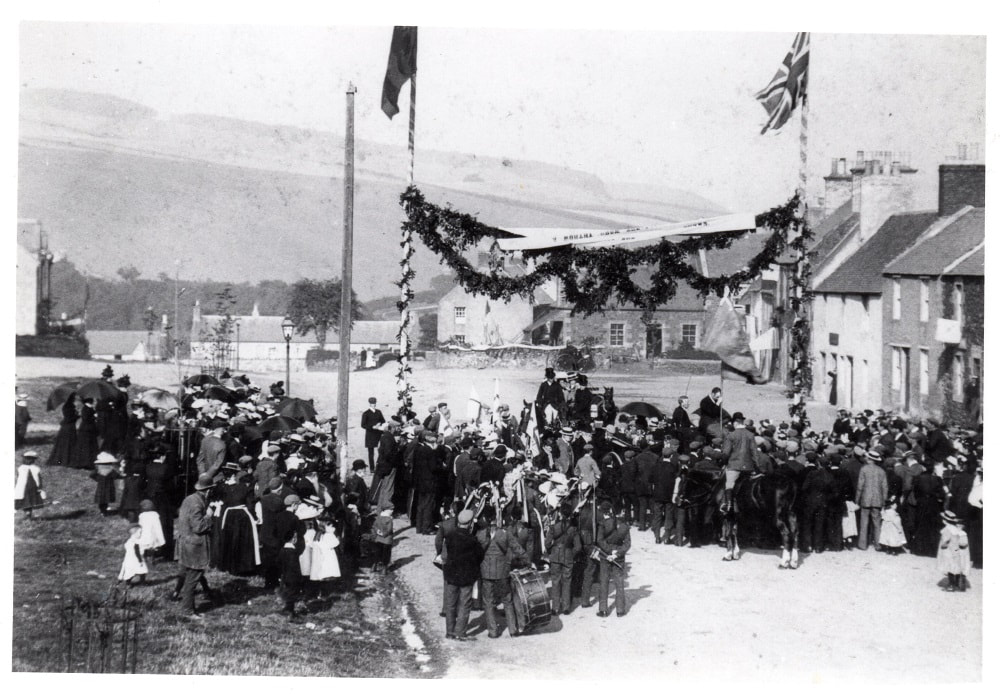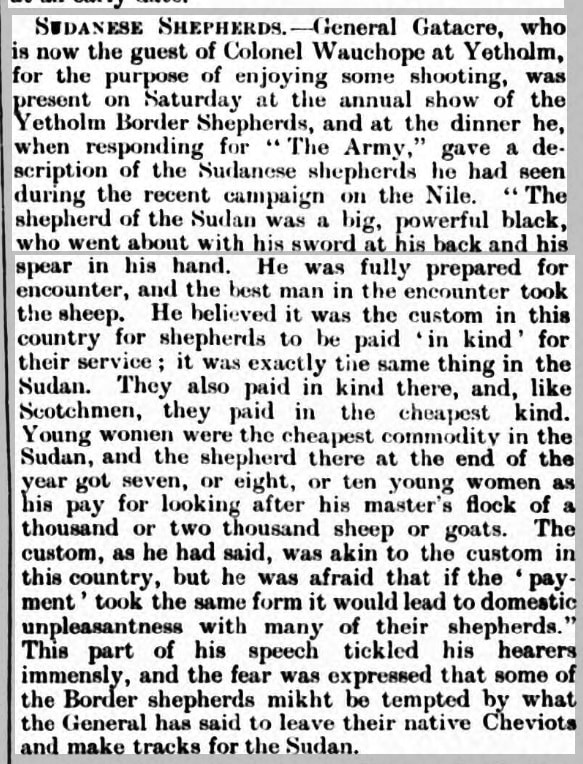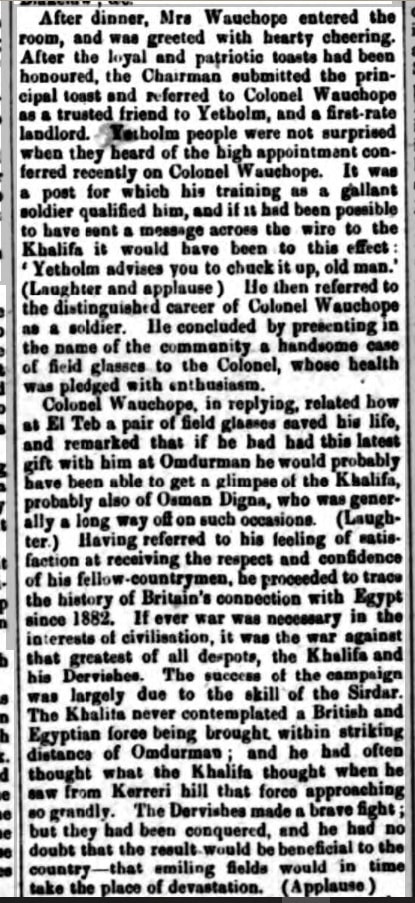|
The photograph shown above, of which we have a copy in the YHS archives, has been something of a mystery. What event is taking place? Bill Rae, who founded the archive, suggested it may have been a religious meeting of some kind. However a closer examination makes this seem an unlikely explanation (click on the image to see a larger version). A very elaborate arch has been erected and two words of the banner at the top can be read: ‘A Worthy …’ A crowd has gathered underneath, in the middle of which there is a carriage, with several well-dressed coachmen and servants in attendance. The crowd seem to be listening to some sort of address. A uniformed band can also be seen. The style of clothing of the spectators suggests a date sometime in the 1890s.
Rather than an open-air religious meeting it seems more likely that the photograph shows the return of Colonel Andrew Wauchope to Yetholm after his involvement in the Second Sudanese War – the campaign against the Mahdi and his dervishes. Colonel Wauchope played a prominent part in this war and took part in the battles of Atarba and Omdurman, the latter famous for involving the last cavalry charge by a British regiment, in which Winston Churchill participated. Andrew Wauchope was active in both political and military affairs at this date and his movements and opinions were well covered by contemporary newspapers. The Battle of Omdurman took place on the 2nd September 1898. By the end of that month he had returned to London. While he had been in Egypt his wife was residing in Yetholm Hall. On the 1st October the Jedburgh Gazette reported that she had received a telegram in Yetholm informing her of his return and that she was going to travel to London to meet him. The couple then arrived in Kelso on Tuesday 4th October. The celebrations that marked their arrival were widely reported, both nationally and locally. This is the account in the Jedburgh Gazette on the 8th October: Welcome to Col Wauchope - Colonel A. G. Wauchope, who commanded the first British Brigade at Omdurman, arrived at Kelso on Tuesday, and received a very hearty welcome. The station was nicely decorated, and the Colonel was met by Sir William Muir, Miss Muir, Mrs Arbuthnot, and party, along with a deputation from Yetholm, consisting of the Rev. W. Carrick Miller, Mr George Mather, and Mr William Guthrie. There was an immense gathering of the town's folk, and as the train steamed in hearty cheers were raised, while a' feu de joie’ was fired by the train itself in passing over fog signals. Colonel Wauchope, who was accompanied by Mrs Wauchope, seemed in the best of health, and was agreeably surprised at the heartiness of the welcome accorded to him. On alighting from the train, the misses Simpson, daughters of Professor Simpson, who is at present residing at Sunlaws, presented Mrs Wauchope with a bouquet, while the Rev. Mr Carrick Miller, on behalf of the inhabitants of Yetholm, presented to the Colonel an address of welcome. The Volunteer pipe and drum band played the party out from the station to the public road, and the carriages, amid the heartiest of cheering, then proceeded to Yetholm. A very large gathering of Yetholm villagers met the Colonel, and the horses were at once unyoked. The members of the Parish Council headed the procession, followed by the Boys Brigade, &c., and the pipe band, while the carriage containing Colonel and Mrs Wauchope was pulled by a number of young men to a central part of the village. Triumphal arches, each supporting appropriate mottoes, were here and there erected, and great enthusiasm prevailed. Under the central arch a platform was erected, and the carriages were there stopped. Mr Mather read another address of welcome. In this acknowledgement was made of the Colonel's practical interest in the welfare of Yetholm and its people, their great joy at his safe return from the Soudan, and their gratification at the special selection of his name for preferment. The Colonel, who seemed deeply moved, said there was nothing that could make him more proud than the reception of that day, and the particular heartiness of it could not but be regarded as an incentive to him to go forward, as had always been his desire from youth, in the great, though arduous, profession of his selection. ln the recent campaign he had only occupied a subordinate position, but he thought he was free to congratulate the country on the fact that Britain’s flag was once more flying with that of Egypt over the bloodstained walls of Khartoum (Hear, hear, and cheers). The result would not only, in his opinion, be a gain to civilisation, but also a gain to the world at large (Hear hear.) He concluded by expressing his gratefulness to the people of Yetholm for the heartiness of the welcome, and remarked that Mrs Wauchope, at a direful period of her life, had come to Yetholm because she knew that there were the kindest of hearts at Yetholm. (Applause) A handsome bouquet was presented to Mrs Wauchope by one of the school girls. The procession went through the village and back again to the hall. The festivities marking the colonel’s return to Yetholm which are described here are surely what we see recorded in the photograph. 1898 was the year in which Yetholm’s name was emblazoned around the world – the huge coronation of the gipsy king Charles Faa Blythe had taken place in May and accounts of the event appeared in newspapers all over the British Empire. Colonel Wauchope’s adventures at Omdurman and his return to Yetholm were slightly less prominent, but they too were widely reported. Soon after his return to Yetholm the colonel was visited by Lord Wolsley, his Commander-in-Chief, who was staying at nearby Ford Castle, and the pair of them went to pay their respects to the newly crowned monarch in his palace in Kirk Yetholm (this is also reported in the Jedburgh Gazette of 8th October). Shortly thereafter he returned to his main house at Niddrie, but was back in Yetholm for the show, where he gave a jovial (and very politically un-correct speech), drawing on his experience of shepherds in Sudan (click on image below left). Later in the month a special meal in his honour was held in Yetholm Town Hall (now the Youth Hall). Some details of his speech on this occasion can be seen below, right (Jedburgh Gazette 19th November 1898) Colonel Wauchope was to return to Africa in the following year – where he was killed at the battle of Magersfontein in South Africa. He was, of course, commemorated by the obelisk on Town Yetholm village green, which was unveiled by his widow in September 1902. One wonders, in these times when ‘colonialist’ attitudes are rather frowned upon, how long it will be before this prominent Yetholm landmark is tumbled over in disgrace ..?
42 Comments
|
Archives
July 2024
|



 RSS Feed
RSS Feed
